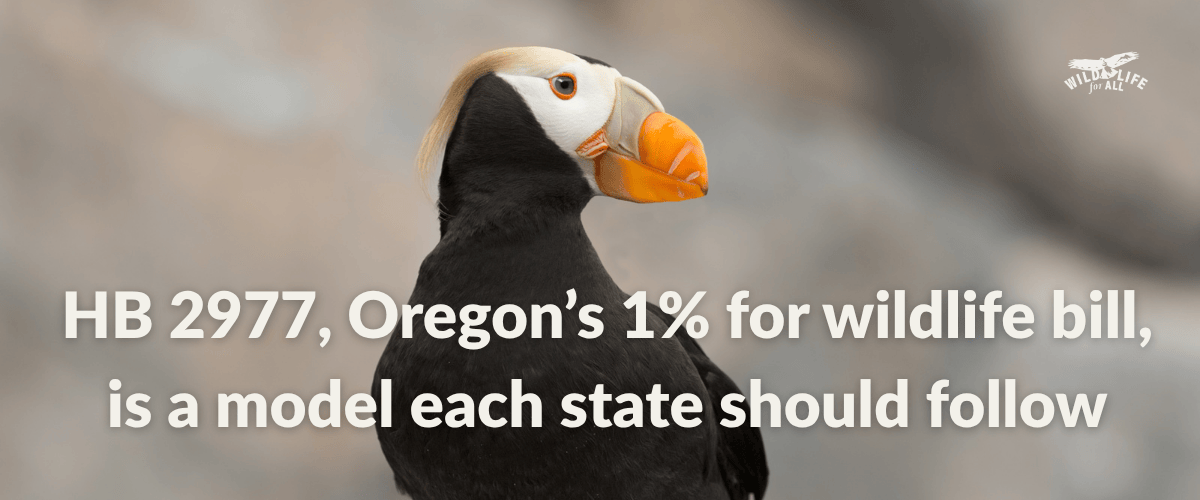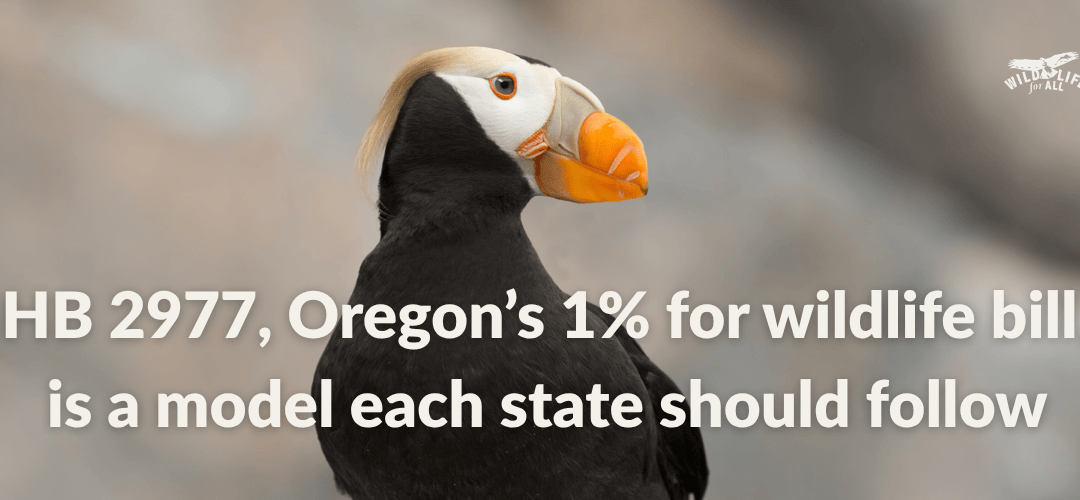HB 2977—the “1% for Wildlife” bill—isn’t just a funding fix. It’s an urgent governance reform that every state in the nation should be watching.
 Oregon’s “1% for Wildlife” is a Model Every State Should Follow
Oregon’s “1% for Wildlife” is a Model Every State Should Follow
Why the fight to fund native species recovery is essential governance reform—and a smart investment in our future
As Oregon’s iconic puffins returned to Haystack Rock and orcas made headlines off the coast, they reminded us of what makes this state so beloved: wild, vibrant ecosystems full of life. From kayaking the Rogue to hiking the Steens, Oregon offers world-class outdoor experiences that support a $15.6 billion recreation economy and more than 220,000 jobs.
But while Oregon’s natural beauty draws millions each year, the very ecosystems that make the state a destination are running on fumes. Nearly 300 native species are at risk, and Oregon’s wildlife agency has little funding to do anything about it.
That’s why House Bill 2977—the “1% for Wildlife” bill—isn’t just a funding fix. It’s an urgent governance reform that every state in the nation should be watching.
What’s Broken: Wildlife Funding in Oregon—and Beyond
Like many states, Oregon’s Department of Fish and Wildlife (ODFW) relies heavily on hunting and fishing license sales and federal excise taxes on guns and ammunition to fund its work. But here’s the problem: 88% of Oregon’s species aren’t hunted or fished. And those funding streams weren’t designed to recover pollinators, songbirds, amphibians, or threatened ecosystems.
What’s worse, only about 2.75% of ODFW’s budget is currently directed toward implementing Oregon’s State Wildlife Action Plan—the blueprint for protecting imperiled species before they disappear.
This is not just an Oregon problem. It’s a national one.
Across the U.S., wildlife agencies are trapped in a 20th-century funding model that leaves the majority of species behind and ties conservation to extractive use. As species crash and climate pressures mount, states need new, durable, and equitable funding models that recognize the value of all wildlife—not just the ones people pay to shoot or catch.
The Fix: HB 2977, or the 1% for wildlife bill
HB 2977 offers a clear, elegant solution. It proposes adding just 1% to Oregon’s existing 1.5% state lodging tax—a fee paid overwhelmingly by out-of-state visitors—to fund the protection of Oregon’s wildlife and wild places. That tiny bump (less than the cost of a cup of coffee for a $200 hotel stay) would bring in an estimated 10% increase to ODFW’s budget, targeted at habitat restoration, wildlife crossings, species recovery, and climate resilience.
Critically, this approach doesn’t pit user groups against each other. Instead, it helps balance the agency’s funding so that non-consumptive users—hikers, birders, photographers, and everyone who simply enjoys wildlife—contribute fairly to the stewardship of the ecosystems they love.
Neighboring states like Washington and California already charge much higher lodging taxes, and research shows such fees do not deter tourism. Instead, they ensure that those who benefit from nature-based tourism also help sustain the ecosystems that make it possible.
Why HB 2977 Is a Blueprint for the Nation
Oregon’s “1% for Wildlife” bill shows us what modern, democratic wildlife governance can look like:
- It diversifies funding beyond the narrow scope of hunting and fishing.
- It reflects public values, recognizing that most Oregonians—and Americans—care deeply about wildlife and want to protect it.
- It strengthens climate resilience through habitat restoration and species recovery.
- It democratizes conservation, making it a shared responsibility and a shared investment.
For too long, wildlife agencies have been underfunded and structurally skewed toward serving a minority of the public. As federal dollars shrink and biodiversity loss accelerates, states must act—and Oregon is showing how.
A slight raise in Oregon’s existing tourism tax on lodging—covering hotels, short-term rentals, and campgrounds—is an ingenious idea to create a long-term, sustainable funding source for wildlife and habitat conservation, with the people who come to see wildlife directly paying in to support their protection and conservation.
This modest increase would help fund the recovery of Oregon’s most imperiled species, protect and restore critical habitats, and bolster biodiversity—all of which are essential to the state’s thriving outdoor recreation and tourism industries. If passed, HB 2977 would be the most significant investment in wildlife conservation in Oregon’s history. It would also launch several urgently needed programs, including a new wildlife stewardship initiative, dedicated support for a wolf coexistence biologist, grants for wildlife rehabilitation centers working on the frontlines, and expanded funding for anti-poaching enforcement.
HB 2977 gives us a rare and powerful opportunity to turn the tide—and make a bold, lasting investment in the future of Oregon’s wildlife, and model this success for the nation.
What’s at Stake
If HB 2977 passes, it will help fund:
- Wildlife crossings that prevent deadly collisions for people and animals
- Habitat restoration for species like salmon, bighorn sheep, pollinators, and migratory birds
- Recovery efforts for species of greatest conservation need
- Protection of ecosystems that support recreation, tourism, and cultural heritage
This isn’t just about saving a few rare species. It’s about safeguarding the ecological infrastructure that supports our economy, our health, and our way of life.
Call to action: Pass HB 2977
Oregon is at a turning point—and so is the nation. If we want thriving ecosystems, healthy wildlife, and resilient communities, we need to start putting our money where our values are.
If you live in Oregon, support HB 2977 by telling your state legislators: It’s time to modernize wildlife funding—for everyone, and every species.
To find your Oregon Senate Senator, use this link: Find Your Legislator. Type in your physical address where it says, “Find address or place” (in the top left-hand side). The first lawmaker listed is your state senator.
To find your Oregon State Representative, use the same link: Find Your Legislator. Type in your physical address where it says, “Find address or place” (in the top left-hand side). The second lawmaker listed is your state representative.
Proposed talking points Courtesy of Humane World for Animals, but feel free to tailor your message:
- As your constituent, I respectfully ask that you vote to support HB 2977, the “1.25% for Wildlife” bill, increasing Oregon’s transient lodging tax to fund wildlife protection and support habitat conservation.
- This bill represents a balanced, proactive approach that benefits wildlife and communities. By making a modest increase to the transient lodging tax, we can invest in long-term conservation, help prevent conflicts, and ensure Oregon’s wildlife remains a treasured part of our state for generations to come. Oregonians care deeply about wildlife; increasing development, outdoor recreation, and human-wildlife conflicts risk many species.
- HB 2977 is not a cost-of-living inflator. It passes the responsibility of funding the conservation of our natural spaces and wildlife to mostly non-Oregonians who visit and enjoy our beautiful state and appreciate our incredible wildlife. Even with the increase, Oregon would still have one of the lowest tourism taxes in the country.
- Along with conserving vulnerable species and habitat restoration, HB 2977 would provide much-needed, dedicated funding for wildlife coexistence, habitat connectivity, anti-poaching efforts, and grant funding for wildlife rehabilitators across the state.
- Please pass HB 2977 today to support the species and habitats that make Oregon an incredible place to visit.
Live outside Oregon? You can still take action!
Oregon’s 1% for Wildlife bill (HB 2977) is a game-changing model for state-level conservation funding—and your state can do the same. Wildlife everywhere is in crisis, and most state agencies lack the funding or authority to protect the vast majority of species that aren’t hunted or fished.
Here’s what you can do:
-
Learn whether your state’s wildlife agency can protect invertebrates, pollinators, and other at-risk species. Many can’t—yet. If yours is one of those, use our Advocacy Toolkit to get started on making change.
-
Push your legislators to fund your state’s Wildlife Action Plan with new, sustainable revenue sources like a tourism fee or general fund investment.
-
Talk to your state tourism board about the value of non-consumptive wildlife recreation—and how it can help fund biodiversity recovery.
-
Use Oregon’s bill as a template to start the conversation with allies, wildlife rehabbers, scientists, and policy champions in your own backyard.
We need a nationwide movement to save biodiversity—state by state, solution by solution. Let’s get to work.

